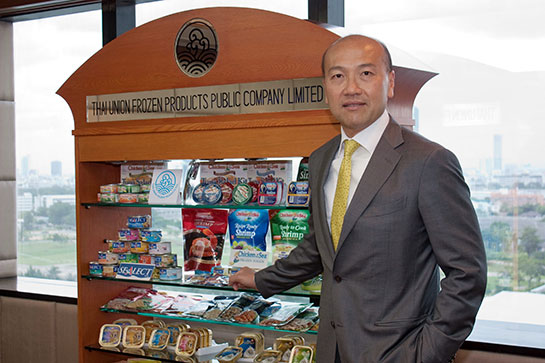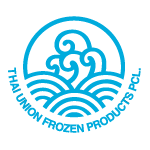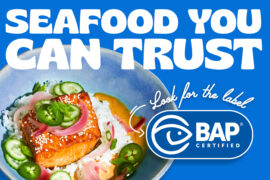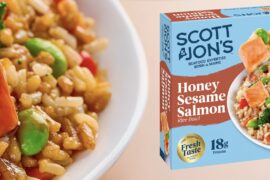With the USA and Europe accounting for 72% of US $3.66 billion in sales generated last year by Thai Union Frozen Products Plc (TUF), and receipts in Japan and the domestic market representing 14% of the total, the Bangkok-headquartered company is looking to develop more business in other markets to push sales past $4 billion in 2014. A number of countries in South America, which have high purchasing power relative to some ASEAN members yet currently figure for only 1% of the company’s revenues, are high on the list for sales expansion.
“As of now, consumption is growing there, spurred by economic growth in the region. We are looking for further opportunity to widen our business there, probably by teaming up with business partners in the near future,” said Thiraphong Chansiri, TUF’s president and ceo.
Ranked as the world’s biggest tuna processing and marketing company, and regarded as a major player in the frozen shrimp business, TUF would likely have topped $4 billion in sales during 2013 had it not been for the devastating impact of early mortality syndrome (EMS) disease on farm-raised shrimp production in Thailand and elsewhere in Asia. This year, Thai shrimp output is expected to rise by 50,000 tons to 300,000. If the rebound occurs, however, the result will still be way below the normal level of 500,000 tons.
 Thiraphong Chansiri, president and ceo of Thai Union Frozen Products Plc, expects to see the Bangkok-headquartered company’s sales reach US $4 billion this year. The goal for 2015 is $5 billion, before rising to $8 in 2020.
Thiraphong Chansiri, president and ceo of Thai Union Frozen Products Plc, expects to see the Bangkok-headquartered company’s sales reach US $4 billion this year. The goal for 2015 is $5 billion, before rising to $8 in 2020.
Shrimp sales typically bring in about 25% of TUF’s annual turnover, compared to 47% fetched by tuna last year. Pet food accounted for 7% of sales in 2013, sardines and mackerel, 6%, salmon, 4%, and other products, 11%.
The company’s sales goal for 2015 is $5 billion, with a gross margin of 14%. By 2020 TUF hopes to ring up around $8 billion in turnover.
“There are many opportunities to grow, as long as we stay focused and understand the markets in which we are doing business,” President Thiraphong commented to this reporter during the THAIFEX – World of Food Asia show in Bangkok three years ago, when predicting that the company would double sales to $4 billion by 2015. Well, by all accounts, TUF is well ahead of schedule.
Markets span the globe, and so does Thai Union’s production base, as it has acquired and invested in factories in the United States, India, France and elsewhere in recent years.
While a network of processing plants in Thailand remain responsible for most output, acquisitions abroad have played an increasingly important role in expansion. In 2000, after being a large shareholder Chicken of the Sea for three years, TUF became the sole owner of the San Diego, California-headquartered canned tuna company. Then in 2003 it acquired New York-based Empress International to enhance distribution of frozen shrimp and other high-value seafood products to foodservice and retail buyers in North America. Three years later it combined the frozen operations of both companies through formation of a division called Chicken of the Sea Frozen Foods.
TUF rocketed into the upper echelon on the European canned seafood sector in 2010 after buying Paris-headquartered MW Brands Holdings SAS from New York-based Trilantic Partners, a former private equity division of now-defunct Lehman Brothers. In one fell swoop the deal delivered John West, Petit Navire, Mareblu and Hyacinthe Parmentier brands to Thai Union, as well as four processing plants in France, Portugal, Ghana and the Seychelles. It also picked up five fishing vessels in the bargain.
Elsewhere, Thai Union raised its profile in India some years ago by boosting its share in the nation’s second largest shrimp feed manufacturer, Avanti Feeds Limited (AFL), to almost 15%. Listed on the Bombay Stock Exchange, the Hyderabad-headquartered company also produces frozen shrimp. TUF, which had assisted Avanti with technical know-how for many years, opted to invest in AFL after the Indian government decided to permit the farming of white Penaeus vannamei shrimp in addition to the Penaeus monodon black tiger variety.
Thai Union wanted a strategic partner in India at a time when shrimp production was poised to escalate and the domestic sales of value-added frozen and canned seafood products were expected to increase.
Meanwhile China, where TUF’s Century brand is well known and which not long ago became a net importer of fishery products, continues to loom large on the company’s radar screen.





